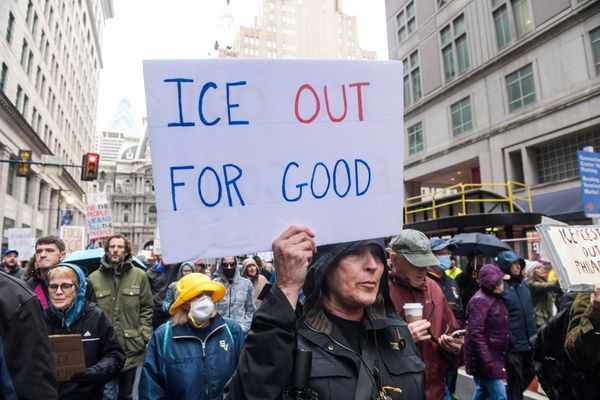LOS ANGELES — Nearly three years ago, American Airlines pledged to eradicate its greenhouse gas emissions by 2050 in an effort to help avoid the most catastrophic effects of climate change.
One of the largest airlines in the world, American carved a path toward its net-zero goal by focusing on six key sectors, including sustainable aviation fuel, fleet renewal and operational improvements.
"At American, we know that the challenge of climate change is acute and imminent, and we recognize our industry's contribution to it," the airline's website says. "We believe we have an obligation to our customers, team members, shareholders and the communities we serve to transition to operating a low-carbon airline."
But a recent report has called that commitment into question. The Corporate Climate Responsibility Monitor found American Airlines' strategies to be of "very low integrity," saying the airline's net-zero promise lacks a commitment to reduce its own emissions, and that its offsetting program "has the potential to mislead customers."
The online retail giant Amazon fared somewhat better. Its "net-zero carbon" by 2040 pledge was found to be of "low integrity," because the promise "remains unsubstantiated," the report said.
American Airlines did not respond to multiple requests for comment. A spokesperson for Amazon declined to comment.
As the United Nations Intergovernmental Panel on Climate Change urges humanity to slash carbon pollution by nearly two-thirds by 2035, many corporations have responded to demands for action by releasing pledges that appear to significantly reduce their contributions to global warming.
But without a standardized means of evaluating those pledges, environmental advocates say it is impossible to discern whether a corporation is making a sincere effort to cut carbon emissions.
Now, state Sen. Scott Wiener (D-San Francisco) has proposed a law that seeks to end corporate greenwashing — a false or misleading type of marketing that claims a company is environmentally friendly when it actually does little to combat climate change.
Senate Bill 253, the Climate Corporate Data Accountability Act, would require the California Air Resources Board to adopt regulations requiring public and private companies with more than $1 billion in annual revenues that do business in California to publicly reveal their greenhouse gas emissions across three "scopes" beginning in 2026. It would be the first law in the country like it.
"Companies are out there making claims that they're net zero, or carbon neutral, or that they're on the path to net zero, and it's really hard to assess whether those claims are true without understanding what the actual carbon footprint of the company is," said Julia Stein, deputy director for the Emmett Institute on Climate Change & the Environment at UCLA School of Law. "There's no mechanism that we have right now that mandates disclosure of those emissions, so this would be a step towards that."
The bill would also authorize the state attorney general to file a lawsuit against a company for violations of the law. The Senate Environmental Quality Committee recently supported the bill in a 4-2 vote.
"Large corporations have a big role to play in reducing carbon emissions, and transparency is a big step," Wiener said.
Opponents of the bill, including the California Chamber of Commerce, say that emissions reporting is "more of an art than it is a science," and worry that double-counting of emissions and other complications will give out-of-state businesses an unfair advantage over California-based corporations. They also question whether the Air Resources Board has the authority to regulate out-of-state companies bringing goods to California.
However, experts say there is an increasing public appetite for corporate climate disclosures.
A 2021 survey of 1,115 Americans found that 87% believe it's important for corporations to be transparent about their climate impacts.
Other countries also have had greenwashing on their minds. The European Union this year proposed a law that would require companies to prove their green claims with evidence. And at the COP27 climate conference in Egypt last year, experts from the United Nations introduced a report cracking down on empty net-zero claims.
According to the Corporate Climate Responsibility Monitor, the net-zero vows of 24 assessed companies added up to a combined 36% emission reduction by their respective target years.
"That's really quite shocking to see, particularly because those companies portray themselves as climate leaders in their communications or through those initiatives, but when we take a closer look, for most of them, we cannot confirm that," said Frederic Hans, a climate policy analyst at New Climate Institute and co-author of the report.
Mary Creasman, chief executive of California Environmental Voters, one of the bill's sponsors, said that California is particularly suited to lead the country against climate change.
"Being the [fifth] largest economy in the world, we have such a powerful role to play — to use our market share and our market power to advance climate action," she said.
"California has a big enough economy that companies won't just say, 'OK, we're not going to do business in California anymore.' That's impossible," she said.
Critics worry that small and medium size businesses will bear the financial burden of the bill.
Mandating companies to report their supply chain emissions would force large businesses to stop working with smaller ones, the California Chamber of Commerce wrote. Why? Because they might struggle to measure their greenhouse gas emissions and meet requirements, "leaving these companies without the contracts that enable them to grow and employ more workers."
Under the proposed law, scope 1 emissions are defined as direct greenhouse gas emissions from a company and its branches. Scope 2 includes indirect emissions, such as electricity bought by the company. Scope 3 are emissions from the company's supply chain, including waste, water usage, business travel and employee commutes; it accounts for about 75% of a company's greenhouse emissions for many industries.
The chamber and other organizations also raised concerns that the law would fall predominantly on state businesses, saying that it's unclear whether the Air Resources Board actually has the authority to regulate companies doing business here.
"It seems likely that out-of-state or non-California companies would challenge such authority," read an opposition letter to the Senate Committee on Environmental Quality. "Because of this uncertainty, the burden will fall on California-based companies, giving out-of-state and foreign companies a market advantage, driving production out-of-state and increasing the cost of goods for California residents."
SB 253 is a revival of Sen. Wiener's SB 260, which passed the Senate last year but was killed in the Assembly by one vote.
Wiener and some of the bill's sponsors said Assembly leaders at the time had voted on some "very tough climate bills" before they brought his bill to the floor. By the time they did, there was "fatigue" and "burnout" among the members, Wiener said.
"I can't guarantee that this or any bill will pass — it's a tough bill with a lot of aggressive, well-funded opposition — but we definitely have a path to getting this passed and to the governor's desk," he said.
But if it doesn't, conversations about carbon disclosure aren't expected to end, experts say.
"There is a significant amount of consumer and regulatory concern around greenwashing, and so even if this bill doesn't pass this year, I don't think this concept is really going anywhere," Stein from UCLA said. "And I wouldn't be surprised to see other states consider similar legislation or consider things that they can be doing outside of the legislative process to prompt businesses to disclose emissions."







